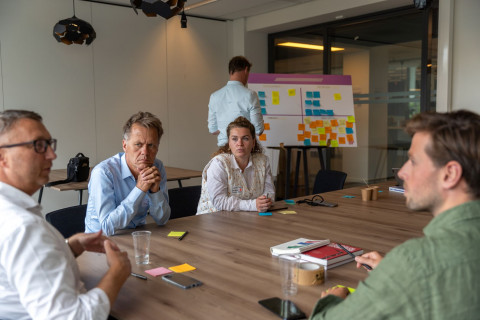For the sixteenth edition of our Demo Days, we were finally able to meet offline again since the start of the pandemic. This meant: old-school post-its instead of filling online Miro boards. The Circular & Digital Demo Day was hosted at one of our partners’ locations, the Digital Society School at the Amsterdam University of Applied Sciences. From reducing illegal drones in the city to reusing materials through a digital material database, in this article you’ll read all about circular & digital projects our partners are working on.
About our Demo Days
The Demo Days are one of the tools we use to stimulate innovation and encourage connection between our partners and community. The purpose of the Demo Days is to present the progress of various innovation projects, ask for help, share dilemmas and involve more partners to take these projects to the next level. More information about the Demo Days can be found here.
Demo Day: Circular & Digital
Reducing (illegal) drones in the city - Daan Groenink (municipality of Amsterdam)
In Amsterdam, and in many other places in the Netherlands, is not allowed to fly drones. But despite the regulations, many drones are still flown illegally over Amsterdam. Daan Groenink from the municipality of Amsterdam invited the participants to reflect on how the city of Amsterdam can reduce (illegal) drone usage with as little enforcement as possible. Many creative interventions were discussed, such as awareness campaigns, making beautiful drone images public, and renting out drones as an experience.
Subsidy scheme for circular chain cooperation - Suzanne van den Noort en Maartje Molenaar (province of Noord-Holland)
The province of North Holland wants to be 100% circular by 2050. To achieve this, an action agenda has been drawn up for 2021-2025 with strategic and operational goals. The province of North Holland initiated the ‘Circular Economy Subsidy Scheme’ to accelerate the circular transition. The province of North Holland already thought about how this subsidy scheme should work. In this session, the participants gave their feedback. One of the key take outs from the working session was: keep it simple. You want to know that the money is well spent and therefore the conditions of the subsidy scheme should be clear.
Digital material database – Mark van der Putten (municipality of Amsterdam)
The City of Amsterdam is developing a digital material database for the necessary exchange of information to enable the reuse of materials from projects. Projects can use this database to report their available materials or to reserve materials. In this way, a street can be paved with tiles from an old project. The municipality of Amsterdam asked for input from the Amsterdam Smart City network on what to keep in mind while developing a digital material database. During the session, the participants discussed topics such as data governance, data ownership and the advantages of a SAAS solution compared to a self-built database. The municipality of Amsterdam will continue to research how the material database could be used and what the stakeholders think of it during 6 pilot projects.
Want to join the next Demo Day?
Are you working on an innovative project that could use some input? Or are you preparing for an inspiring event that needs a spotlight? Our next Demo Day takes place on the 11th of October. If it fits within our themes (circular, mobility, energy and digital), sent a message to Sophie via sophie@amsterdamsmartcity.com or let us know in the comments. We are happy to talk with you to find out if it's a match!
Would you like to participate in the next Demo Day and share your thoughts on our partners’ innovative projects? As soon as the program for the next Demo Day is determined, we will share it on the platform and give you the opportunity to join as participant.
Curious to mobility & energy projects? Read more about it in the recap of Demo Day Mobility & Energy.
Photo: Myrthe Polman





If you have input for the above-mentioned projects or if you would like to get in contact with anyone leading the projects, feel free to contact me at sophie@amsterdamsmartcity.com